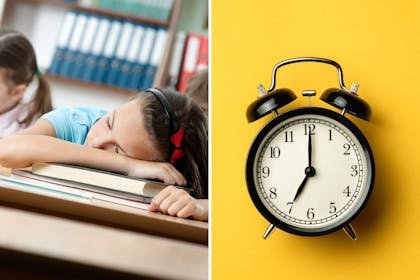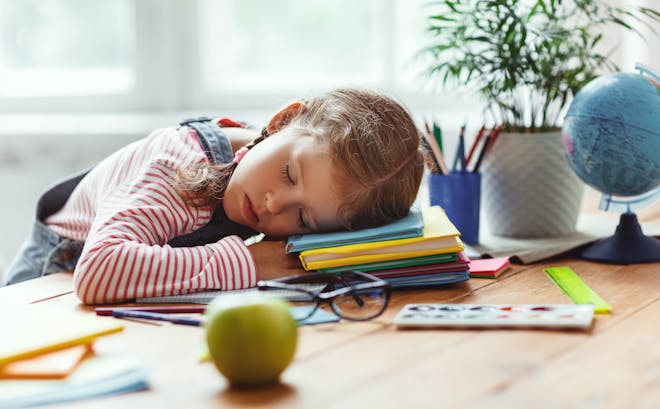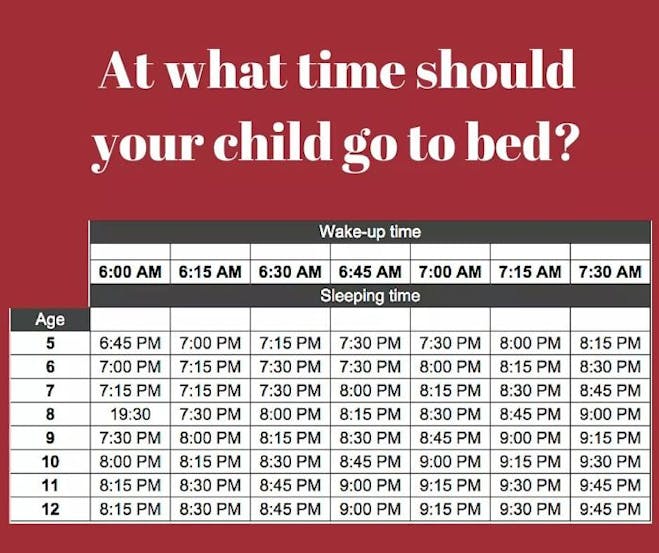Teacher reveals ideal bedtimes for kids – and you may be surprised

If you think you know what time your kids should be going to bed, think again! Here's what one teacher says are the ideal bedtimes for all ages from babies to pre-teens
Sticking to a regular bedtime routine is bad enough at the best of times. But with kids just back to school after a long summer off, it can become a battle ground.
And while you might think you know exactly what time your little one should be hitting the sack to make sure they're bright eyed and raring to go the next morning, you might be in for a shock.
A teacher from the US has shared a sleep chart detailing ideal bedtimes for kids ages from 5 to 12. And the advice has certainly divided opinion.
- Kids with a sore throat 'should attend school'
- Eye tracking device could diagnose autism in toddlers
- Mum's fury as ex excludes eldest child from family holiday
- 6yo daughter uninvited from birthday party

Stacy Karlsen from Wilson Elementary in Kenosha, Wisconson, US, said she thought the chart might be useful for parents at her school, and posted it online.
Within days it had tens of thousands of likes on Facebook, and had been shared more than 350,000 times.
'This is super helpful'
Talking to a local news station, Fox6Now, Stacy, who teaches first grade children, explained:
'To me, it was a shock [that the post was shared so much]. I found it coming across my personal page and I thought, wow, this is super helpful.'
Of course it got lots of replies – more than 14k at the last count! – with many agreeing and (and some disagreeing!) with the chart.
Bedtimes according to age
Of course every family and every child is different, so nothing is set in stone. But there is an argument that, often, children simply are not getting enough sleep to be able to properly function during the day.
What are the ideal bedtimes?
Here's when the chart suggests your child SHOULD be going to sleep. The bedtime range depends on whether they get up at 6am or 7.30am. So a 6-year-old who gets up at 6am needs to be in bed by 7pm, whereas a 9-year-old 7.30am riser can stay up until 9.15pm.
5 years old: 6:45pm to 8:15pm
6 years old: 7pm to 8:30pm
7 years old: 7:15pm to 8:45pm
8 years old: 7:30pm to 9pm
9 years old: 7:30pm to 9:15pm
10 years old: 8pm to 9:30pm
11 & 12 years old: 8.15pm to 9.45pm.

Divided opinions
While many found the chart useful, others were not so sure.
'My kids have always had bedtimes along the lines of this chart and got good grades in school and almost never more than a sniffle. There is definitely some good advice here,' said one mum, while another agreed it justified the bedtimes she had already put in place for her little ones.
'I have four kids and I catch a lot of flack for their bedtimes,' she wrote. 'I started out setting their bedtime years ago based on how much sleep they need... Glad to see this chart justify the exact times we have already set.'
Not everyone thought it was realistic though. One parent compared it to military guidelines, while another complained 'this is completely unrealistic. I still have to feed him, get his homework/studying done, bath time, get ready for bed and bedtime story, not to mention trying to get in some quality time. I'm lucky to get him in bed before 9. This might be great for 2 parent homes and stay at home moms, but for us single parents not so much.'
One parent summed up what most of us are probably thinking when it comes to getting kids to bed at a set-in-stone time, though: 'Yeah right – in your dreams!'
What do you think? Is this about right or way off the mark?
Struggling to get your child to sleep?
If bedtime as become a battleground, there is a lot of help and advice out there. The Sleep Charity has this to say about creating a good bedtime routine.
- Take time to plan your routine. Start an hour before your child's bedtime if possible, and display the routine where everyone can see it.
- Do the same thing every day, including the time you wake the kids up. It's important for setting your child's body clock.
- Dim the lights in the hour before bed to encourage the production of melatonin and promote that sleepy feeling.
- Younger children may enjoy a bedtime box, filled with a selection of activities to carry out during the routine. Hand eye co-ordination activities such as jigsaws, colouring and threading are great for promoting relaxation.
- A bath 30 minutes before bed can help to promote sleep
- A bedtime story is a great way to end the day or older children may prefer to read on their own.
Related stories





